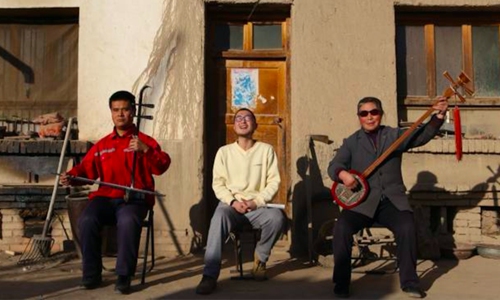HOME >> ARTS
Chinese musician preserves folk art and rural life of his hometown through music
By Ji Yuqiao Source:Global Times Published: 2020/3/3 19:18:40 Last Updated: 2020/3/3 14:18:40

Zhang Gasong plays music. Photo: Courtesy of Zhang Gasong
"Singing is my life and my life is singing, just like other veteran folk artists living in rural areas. Even when they are speaking, you feel like they are singing."Zhang Gasong, a folk singer born in a mountain village of Northwest China, yearns to become one with his music.
Incorporating Japanese and English into the folk music of Northwest China, Zhang and his creative music videos have gone viral on Chinese social media, capturing the attention of netizens including Shui Junyi, a well-known Chinese journalist also from Northwest China.
Although Zhang now lives in Dali, Southwest China's Yunnan Province, he still returns to his hometown in Northwest China's Gansu Province every year to search for inspiration.
"I spend two or three months each year walking around rural villages and talking with folk artists in Northwest China. I have talked to more than 100 folk artists. They are so good at diverse folk arts including dance and telling folk stories," Zhang told the Global Times.
Zhang said he is trying to use his music to preserve the culture of the rural villages in Northwest China, which have been changing a lot in recent years, and record the many kinds of folk arts in the region, which are gradually disappearing.
"I am also calling on more people to record and remember all these things that make up the true history of the region together with me."

Zhang Gasong plays music. Photo: Courtesy of Zhang Gasong
Life at home
Zhang's music journey started dozens of years ago. His first experience with rock'n'roll was during middle school, and he soon became addicted to the music's charm.
"I found some part-time jobs at that time to make money and finally earned 210 yuan($30)to buy a guitar. That guitar is still kept at home," Zhang said.
Since then, Zhang has tried many styles of music and even established a band in college. However, it was during a trip back to his hometown he found his true love, the folk music of his hometown, which has a free, rough style that goes straight to the heart.
The musician said that the folk music of Northwest China can be traced back to hundreds of years ago and it has more than 30 tunes.
"It is natural just like breathing. There is folk music for all types of natural sounds - the sound of water, wind and even chickens. I can sing anything I see in my hometown."
"Talking with veteran folk artists is one of the most important ways to find inspiration. You can see entire stories just by looking into their eyes," Zhang said.
Liu Yanbiao, a blind 78-year-old musician who lives in Northwest China's Qinghai Province, is one of the many folk artists Zhang respects. Liu has spent almost his entire life playing banhu, a traditional Chinese plucked instrument.
"When he speaks, you feel like he is singing a song. His accent and the tempo when he speaks are all musical and is full of life," Zhang said.
"I have learned a lot just from watching his expressions while he sings. Every time I visit his home, he also shares with me his life experience. It has been very beneficial."
With instruction from older masters and his own creativity, Zhang has produced five albums that depict the life of his family and the changes that have taken place in China's villages.
"Before going to university, I lived in a small mountain village. Although my family and other villagers were all poor at that time, we were happy. I did not have any anxiety. Neighbors helped each other and shared happiness with each other."
After moving to a larger town, Zhang felt that everything had changed. Although his standards of living had improved, since most of his neighbors kept their doors closed all day he felt it lacked the closeness of his former home.
"I want to preserve that original lovely town, so in my music you can feel a sense of homesickness."
Heading abroad
Zhang not only appreciates Chinese folk music, but also folk music from all around the world.
"Every language has its own melody. Singing a song in Japanese sounds very different from singing in Chinese," he said.
In one of his music videos uploaded to China's Twitter-like Sina Weibo, he sings the Northwest China folk song "Three Sisters" in Japanese. The video has received numerous compliments.
"He is so talented that he can combine Japanese with Chinese music. I love it," one Chinese netizen commented.
Japanese isn't the only language he sings in. He has also adapted Chinese folk songs to English. Singing happily in these English music videos, his only accompaniment is sanxian, another type of traditional Chinese instrument.
Zhang says he has been inspired by his friendship and cooperation with musicians from various countries around the world.
Zhang said that he likes playing music with the foreign musicians he has met in Dali.
"They come from Russia, Ireland and Japan, as well as South Korea. Whenever we play the folk music of our homelands together, we are able to quickly understand what we are trying to express."
"Music is a bridge that breaks through the barriers of language and distance and links us together."
Posted in: MUSIC